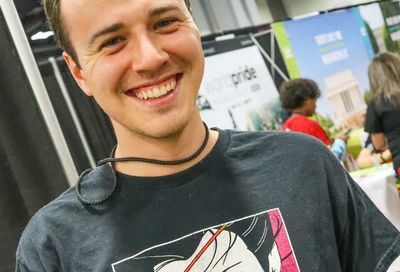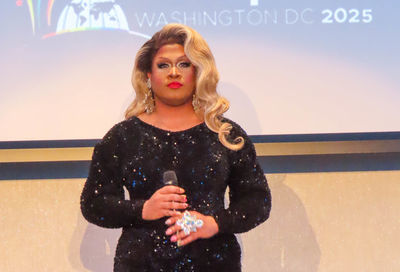Rufus Wainwright: A Timeline
A brief (gay) history of the music of Rufus Wainwright

Born into a family of folk music royalty, Rufus Wainwright’s musical history extends far beyond his first self-titled album. However, he’s been able to break free from his lineage, creating a musical legacy uniquely his own. At times lyrical and grandiose and at others singular and raw, his songs reveal the artist behind the piano, his melodies soaked in his inner turmoils and joys.
Rufus Wainwright (1998)
On October 6th, 1998, Matthew Shepard was brutally murdered. Beaten, pistol-whipped, tied to a fence left to die. With Shepard’s murder, Americans — still not comfortable with the idea of homosexuality — suddenly were confronted with the real dangers of being openly gay. Although part-Canadian, Rufus Wainwright, whose self-titled album debuted in May 1998, was acutely aware of these dangers, something evident throughout his first album.
At the time, Wainwright was twenty-five. It was four years since he had ended a seven-year period of celibacy. In 1988, Wainwright had been brutally raped by a man he picked up in a bar. “I thought it was going to be a romantic walk in the park, but he raped me and robbed me afterwards and tried to strangle me,” he told Contact Music. “AIDS was at its height and you were told that this kind of contact could kill you. So I was just put off sex. I didn’t sleep with anyone again until I was 21.”
Plagued by the loneliness that being gay can sometimes cause, songs like “Foolish Love” demonstrate a man unwilling to give everything to his lover: “Why won’t you last? Why can’t you last?” However, the entire album isn’t melancholic. In “April Fools,” he shows a curious level of optimism, with an upbeat chorus that promises “You will believe in love, and all it’s supposed to be.”
Poses (2001)
From 2000 to 2001, Wainwright spent six months in the Chelsea Hotel in New York City. There, he wrote most of his second album Poses. In the same year, movies like Hedwig and the Angry Inch, L.I.E., and Kissing Jessica Stein were hitting the alternative movie houses across the country. Even Shepard’s story was chronicled in The Laramie Project, which premiered in 2000. Although not yet mainstream, gay issues were inching closer and closer to the center thanks to fringe artistic movements.
During his stay at the Chelsea, however, Wainwright fought not for gay rights, but for his life. Addicted to crystal meth and spending hours having sex with strangers, Wainwright’s life was a whirlwind party that lasted twenty-four hours, seven days a week. “Crystal meth had sort of been around since my L.A. days,” he told Metro Weekly in 2003. “Every time I did it, I was like ‘This is the one for me, this is the great drug.’ It’s cheap. It lasts for twenty hours. Sex is great. You think you’re brilliant.”
What came out of that borrowed brilliance was Poses, an album about “[a] character who sort of has a foray into drugs and nightclubs. He enters in as this beautiful young man and leaves as a wrecked human being.” Faster and more upbeat than his self-titled album, Poses bounces from Gregorian chants to Folksy blues. One of the final tracks is “One Man Guy,” a cover of a song by Loudon Wainwright III, his father. However, the track takes on a new life with Wainwright’s sexuality and feels like a break from the hedonistic life that he was living at the time. Through Poses, it became apparent to Wainwright that the man he was writing about was himself.
The Want Albums (2003-2005)
In May, 2004, Massachusetts became the first state to issue marriage licenses to same-sex couples. Six months later, Wainwright’s fourth studio album, Want Two, was released as the second half of his previous album, Want One. While things were improving for LGBT people around the world, Wainwright was recovering from his crystal meth addiction, which had peaked in 2002 with bouts of blindness and hallucinations of his father. What eventually convinced him that he needed help? A couple of days with former president George W. Bush’s daughter, Barbara Bush. “That freaked the shit out of me,” he told The Guardian. “She’s a kind of ditsy sorority girl but I had this sense … of her being so very close to evil.”
The hallucinations of his father, Loudon Wainwright III, created tremendous internal tension for the singer/songwriter. “I realized suddenly just how unhappy I was,” Wainwright continued. “I believed I had two choices. I was either going to rehab or I was going to live with my father. I knew I needed an asshole to yell at me, and I felt he fitted the bill.”
The Want albums express a longing for his old days of debauchery, but also the necessity of deliverance from that lifestyle. On Want Two, we’re introduced to that savior through the “Gay Messiah.” A silly, lyrical painting of a messianic figure that comes to save the gay community from Studio 54 and the Fire Island Pines. And on Want One, “Vibrate” gives us a glimpse into Wainwright’s newfound maturity. “God knows what all these new drugs do,” he exclaims in world weariness. Want One and Want Two, while companion pieces, reflect two diametrically opposed sensations: light against dark, joy against sorrow, and fulfillment against longing.
Rufus Does Judy at Carnegie Hall (2007)
Weary of American culture, in 2006 Wainwright sought solace in Judy Garland’s live album Judy at Carnegie Hall. Traumatized by the attacks of September 11th, the subsequent War on Terror, and the presidency of George W. Bush, Wainwright wanted to be reminded of the former greatness of the U.S. and the joy that came with that citizenship. “Somehow that album, no matter how dark things seemed, made everything brighten,” Wainwright told the New York Times. “She had this capacity to lighten the world through the innocence of her sound.”
In collaboration with Carnegie Hall, Wainwright recreated Garland’s legendary live performance of Judy at Carnegie Hall. And to a sold out house on June 14 and 15 of 2006, Wainwright revived the golden age diva. “It’s a communal experience; I’m drawing upon a collective unconscious,” Wainwright said to Time Out New York. “In this day and age I think it is important for us, as gay men, to respect that part of history, and not put it in a place of shame.”
In Rufus Does Judy, that history of inescapable optimism comes soaring through in Wainwright’s unwavering tenor. “By the way, this is one of the songs in its original key,” Wainwright mentions before launching into a perfect “Do It Again.” Accompanied by a forty piece orchestra, it proved that his voice was built for these grandiose productions. You can’t help but smile listening to his renditions of Judy’s classics “Foggy Day,” “You Go To My Head,” and “Puttin’ On The Ritz.”
Release the Stars (2007)
After his Carnegie Hall appearances, Wainwright began working on Release the Stars. While initially meant to be only voice and piano, a visit to Berlin changed everything. He was overwhelmed with the German Romanticism of the city. In addition to Berlin’s inspiration, Kate McGarrigle’s (his mother) recent cancer diagnosis pushed him to work relentlessly, believing it would cure her.
In a way, Release the Stars is not unlike the Want albums. Sweeping orchestral movements under complicated piano arrangements complemented with electric guitar riffs, the album is at once personal and political. In “Going to a Town,” a song which he wrote in five minutes before he flew to Berlin, Wainwright continues to express his frustration with the state of the United States. “I’m so tired of America,” he croons. “I’ve got a life to lead.” And a big part of that life for Wainwright was his newfound beau, Jörn Weisbrodt. The song “Tiergarten” recounts their walks through a Berlin park while he was recording the album.
All Days Are Nights: Songs for Lulu (2010)
On January 18th, 2010, McGarrigle died in Montreal, Canada. With just his piano and his voice, Wainwright explores his sadness over the loss of his mother in All Days Are Nights: Songs for Lulu.
The raw nature of this album, produced by Wainwright himself, gives listeners a peek behind the curtain at the emotional underpinnings of the enigmatic musician. While sitting at his mother’s hospital bed, Wainwright worked on the song “Zebulon,” a haunting melody that builds to a climactic ending, which quickly became one of his and his mother’s favorites. And in “Martha,” he details a conversation he’s had with his sister, Martha Wainwright, about visiting their mother in the hospital, and the stress that comes with those visits.
In February, 2011, nearly a year after her grandmother’s death, Wainwright’s daughter Viva Katherine Wainwright Cohen was born.
Out of the Game (2012)
By 2012, the battle for marriage equality was in full swing. With nine states passing same-sex marriage laws and Lady Gaga’s Born This Way anthem lodged in our brains, hope gleamed on the horizon for LGBT Americans. Together since the mid-2000s, Wainwright and Weisbrodt were married in August in Montauk, New York. Earlier that year, Wainwright released his seventh studio album Out of the Game, produced by Mark Ronson.
Wainwright believed there was still work to be done to make everyone equal. To that end, he wanted something enjoyable for all his fans. “The main objective — not for the entire [record], necessarily, but for portions of it — is to be danceable,” he told Rolling Stone. “I just want to make something that you love, driving around in your car listening or losing your mind to on a dance floor. Something to serenade us through these very, very troubling times.”
Out of the Game is a celebration of humanity. From the single “Out of the Game” where Wainwright gives up on being famous to “Montauk,” a touching lullaby to his daughter, this album emerges from Wainwright’s life and paints it in beautiful water colors. But life isn’t always floral. Fittingly, his final song on the album is “Candles,” an “in memoriam” for his late mother.
Support Metro Weekly’s Journalism
These are challenging times for news organizations. And yet it’s crucial we stay active and provide vital resources and information to both our local readers and the world. So won’t you please take a moment and consider supporting Metro Weekly with a membership? For as little as $5 a month, you can help ensure Metro Weekly magazine and MetroWeekly.com remain free, viable resources as we provide the best, most diverse, culturally-resonant LGBTQ coverage in both the D.C. region and around the world. Memberships come with exclusive perks and discounts, your own personal digital delivery of each week’s magazine (and an archive), access to our Member's Lounge when it launches this fall, and exclusive members-only items like Metro Weekly Membership Mugs and Tote Bags! Check out all our membership levels here and please join us today!






















You must be logged in to post a comment.